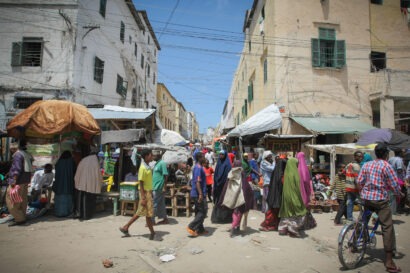Globally, tax collections are declining. Governments have cancelled or postponed some tax dues in the effort to bolster economies and keep enterprises solvent. With employment, trade and profits nevertheless shrinking, opportunities to collect income and profit taxes, VAT, and excise and import duties are also dwindling. For the next two years at least, many governments will find themselves spending much more than they had anticipated, and collecting less. Most are accumulating debts at levels reminiscent of major wars.
They will find it hard to cut their deficits by reducing public spending. Businesses will continue to need support and financial guarantees. Unemployment is likely to remain high. Additional social spending to respond to the crisis will be needed. Most obviously, the pandemic has prompted large, albeit often inadequate, expansions of direct financial support to the poor and vulnerable. It will be morally unacceptable and politically very challenging to cut back those transfers any time soon.
So governments will need to collect more taxes. But what should they tax? And how should they explain their choices to gain the support of their citizens? These decisions will of course reflect national circumstances, but the challenges are similar across countries. The adoption of a common approach would significantly improve chances of wresting opportunity from the crisis.
What are the dangers?
The importance of a compelling vision for future taxation is revealed by considering the alternative. What is the threat? Post-crisis governments will be seeking to raise money in situations where many businesses have gone bankrupt and others remain fragile, and large numbers of people are unemployed or coping on diminished incomes. One risk is that revenue raising will prove too politically challenging, leading to spiralling deficits, reduced services into the future, and an inability to respond adequately to immediate needs. The other is that enhanced tax demands could trigger vicious political conflict among interest groups who feel under threat and entitled to special consideration. Businesses with small profits and large debts will fight any increase in profits tax. Increases in VAT or personal income tax are likely to generate angry opposition. The kind of solidarity politics that have emerged in many countries in the first few weeks of the crisis could disappear quickly once we begin to talk seriously about who will pay governments’ bills.
What are the opportunities?
There are ways of raising the revenue to meet these bills that could conserve these solidarity politics, command public support, and contribute to solving some of the broader problems facing humanity. The three principles behind our suggested tax agenda are:
- The poorest 50% (or even 80%) of households should not be expected to pay more.
- Much of the additional tax burden should fall on wealth – or on those who have avoided economic pain during the crisis.
- Tax plans should present a vision for the future, designed not only to raise revenue but also to address other major societal problems.
What then should be key elements of a response?
First, tax wealth. That is where the South African Revenue Service will be focusing. Globally, wealth has been accumulating in a very small number of hands for decades. Even the International Monetary Fund has been warning of adverse economic and political consequences. Taxing wealth will have little or no adverse effect on the incentives to invest and innovate. Taxes on the income generated from wealth can be increased. Inheritance taxes have been whittled away for decades. Efforts to ferret out enormous amounts of hidden wealth can be intensified, nationally and internationally. Especially in poor countries, property taxes are much under-used and could be scaled up fairly quickly.
Second, where the incomes of wealthy individuals and corporations have been unaffected – or enhanced – by the crisis, add temporary surcharges to their taxes. The IMF (download) and OECD have endorsed these ideas, which the IMF labels ‘solidarity surcharges’. They reflect a simple political logic: confronted with a global crisis, we should all share the cost.
Third, the crisis has accelerated the shift from face-to-face to online interactions. This will further boost the profits of most of the big (and mainly American and Chinese) technology platforms that benefit from strong network effects. They were notorious for their abilities to avoid taxes before the crisis. Finding better ways of taxing them – and digital transactions generally – is now even more important.
Fourth, strengthen taxes to combat climate change. Serious taxes on damaging carbon emissions and other pollutants are long overdue. And such taxes can be designed straightforwardly to raise new revenue for governments while also minimising costs to more vulnerable households or businesses through rebates or other supports. Covid-19 has given us a glimpse of less polluted skies. It would be unforgivable not to seize this opportunity.
Finally, close the gaps for corporations. This is not the time for a general tax increase, but is an opportune moment to confront obviously dysfunctional tax losses. One example is the tax deductibility of interest payments, which encourages firms to depend more on debt than on equity financing. This in turn leads to over-leveraging and exacerbates financial instability. The US government has already taken the lead. It established limits on deductibility in 2017. Another gap is created by opaque tax exemptions for investors that are motivated more by politics and corruption than economic strategy. They are especially common in low-income countries, where they eat away a substantial portion of potential tax revenue. A good pruning would benefit almost everyone. More broadly, it is time for a “new deal” on international taxation that simplifies international rules and enhances cooperation, in ways that are inclusive of developing countries – and which avoids further fragmenting of the international tax system.
Tax is always very political. The politics around the tax response to the pandemic could soon become conflictual, and make constructive public action difficult. It is time for a strong and common tax narrative about our collective human interests in the face of threat, backed by an appropriate menu of tax policies.
Relevant resources to read:
Policy brief: What Might an Agenda for Equitable Taxation Look Like?
Working paper: How Can Governments of Low-Income Countries Collect More Tax Revenue?
Policy brief: Taxing High Net Worth Individuals: Lessons from the Uganda Revenue Authority’s Experience
Policy brief: Corporate Tax Negotiations at the OECD: What’s at Stake for Developing Countries in 2020?



